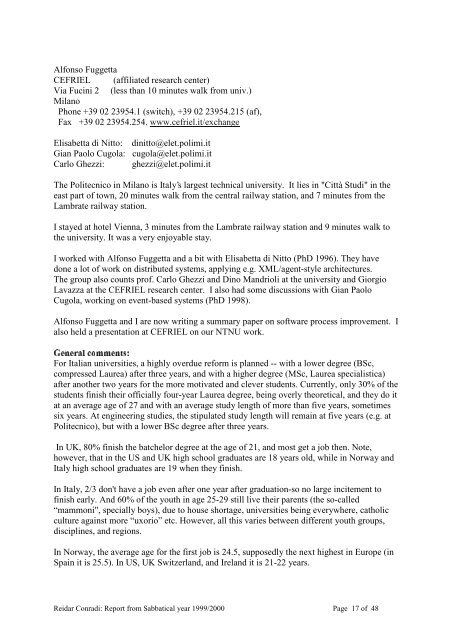( )¤0¤ 2 13$% 2 2 465¤5 57 §¤£¦9 8( A - Department of Computer ...
( )¤0¤ 2 13$% 2 2 465¤5 57 §¤£¦9 8( A - Department of Computer ...
( )¤0¤ 2 13$% 2 2 465¤5 57 §¤£¦9 8( A - Department of Computer ...
You also want an ePaper? Increase the reach of your titles
YUMPU automatically turns print PDFs into web optimized ePapers that Google loves.
Alfonso Fuggetta<br />
CEFRIEL (affiliated research center)<br />
Via Fucini 2 (less than 10 minutes walk from univ.)<br />
Milano<br />
Phone +39 02 23954.1 (switch), +39 02 23954.215 (af),<br />
Fax +39 02 23954.254. www.cefriel.it/exchange<br />
Elisabetta di Nitto: dinitto@elet.polimi.it<br />
Gian Paolo Cugola: cugola@elet.polimi.it<br />
Carlo Ghezzi: ghezzi@elet.polimi.it<br />
The Politecnico in Milano is Italy’s largest technical university. It lies in "Città Studi" in the<br />
east part <strong>of</strong> town, 20 minutes walk from the central railway station, and 7 minutes from the<br />
Lambrate railway station.<br />
I stayed at hotel Vienna, 3 minutes from the Lambrate railway station and 9 minutes walk to<br />
the university. It was a very enjoyable stay.<br />
I worked with Alfonso Fuggetta and a bit with Elisabetta di Nitto (PhD 1996). They have<br />
done a lot <strong>of</strong> work on distributed systems, applying e.g. XML/agent-style architectures.<br />
The group also counts pr<strong>of</strong>. Carlo Ghezzi and Dino Mandrioli at the university and Giorgio<br />
Lavazza at the CEFRIEL research center. I also had some discussions with Gian Paolo<br />
Cugola, working on event-based systems (PhD 1998).<br />
Alfonso Fuggetta and I are now writing a summary paper on s<strong>of</strong>tware process improvement. I<br />
also held a presentation at CEFRIEL on our NTNU work.<br />
OQP£R$P S£TUWVX"YZYP£R$[]\_^<br />
For Italian universities, a highly overdue reform is planned -- with a lower degree (BSc,<br />
compressed Laurea) after three years, and with a higher degree (MSc, Laurea specialistica)<br />
after another two years for the more motivated and clever students. Currently, only 30% <strong>of</strong> the<br />
students finish their <strong>of</strong>ficially four-year Laurea degree, being overly theoretical, and they do it<br />
at an average age <strong>of</strong> 27 and with an average study length <strong>of</strong> more than five years, sometimes<br />
six years. At engineering studies, the stipulated study length will remain at five years (e.g. at<br />
Politecnico), but with a lower BSc degree after three years.<br />
In UK, 80% finish the batchelor degree at the age <strong>of</strong> 21, and most get a job then. Note,<br />
however, that in the US and UK high school graduates are 18 years old, while in Norway and<br />
Italy high school graduates are 19 when they finish.<br />
In Italy, 2/3 don't have a job even after one year after graduation-so no large incitement to<br />
finish early. And 60% <strong>of</strong> the youth in age 25-29 still live their parents (the so-called<br />
“mammoni", specially boys), due to house shortage, universities being everywhere, catholic<br />
culture against more “uxorio” etc. However, all this varies between different youth groups,<br />
disciplines, and regions.<br />
In Norway, the average age for the first job is 24.5, supposedly the next highest in Europe (in<br />
Spain it is 25.5). In US, UK Switzerland, and Ireland it is 21-22 years.<br />
Reidar Conradi: Report from Sabbatical year 1999/2000 Page 17 <strong>of</strong> 48
















